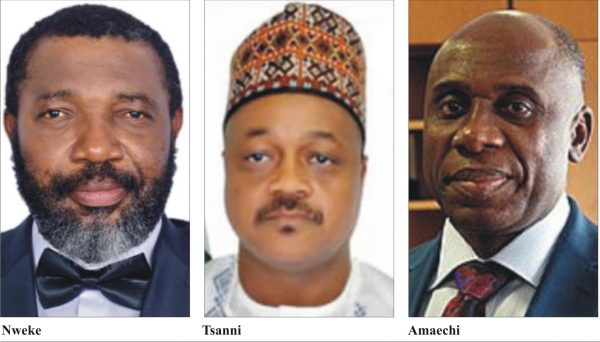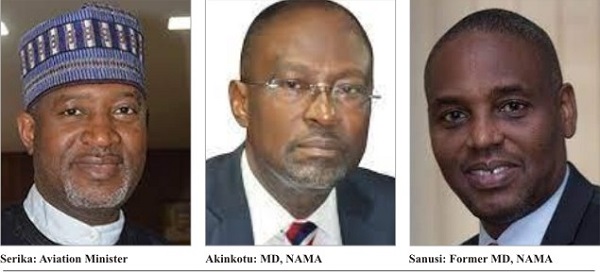Admiralty Law: Legislative and Judicial Challenges
 The Nigerian maritime sector has evolved and so has Admiralty law; but the problem is that the defaulters of the law seem to have a better understanding of the laws in the maritime parlance than some lawyers whilst judges are only left with peripheral knowledge.
The Nigerian maritime sector has evolved and so has Admiralty law; but the problem is that the defaulters of the law seem to have a better understanding of the laws in the maritime parlance than some lawyers whilst judges are only left with peripheral knowledge.
Maritime law is also known as Admiralty law. It is a distinct body of law that governs maritime questions and offenses. It is a body of laws, conventions and treaties that governs international private business or other matters involving ships, shipping or crimes occurring on open water.
Maritime law governs many of the insurance claims relating to ships and cargo, civil matters between ship owners, seamen and passengers, and piracy. Additionally, maritime law regulates the registration, license, and inspection procedures for ships and shipping contracts, maritime insurance and the carriage of goods and passengers.
There has been consistent recommendation from the bi-annual maritime seminar for judges, Nigerian Shippers’ Council and National University Commission to work together on the introduction of Maritime law as a course of study in Nigerian universities.
However, the Nigerian Shippers’ Council has been saddled with the onus to correct this anomaly with the introduction of maritime law as a course in the university will equip judges and lawyers with a better grasp of the subject matter as they are able to understand what the peculiarities of Admiralty law.
Shippers’ Council reached an agreement with the Nigerian Maritime Law Association (NMLA) when the Association paid a courtesy visit to the Executive Secretary of the Council, Mr. Hassan Bello last week.
How can the paucity of knowledge in Admiralty law be addressed? What should be done to ensure the legislature are also sufficiently enlightened about maritime laws to enable them expedite the passage of the pending maritime bills? Who has the onus of developing the curriculum for the Admiralty law in Nigeria? Is there a data bank of Admiralty cases for resource purposes?
Addressing the delegates of NMLA last week, the Executive Secretary of Shippers’ Council revealed that the Minister of Transportation, Hon. Rotimi Amaechi had set up a committee to ensure that faculties of admiralty law are established at universities, which consists of two members of the NMLA.
“We need to change the Admiralty laws in order to provide laws that are predictable and lucid and geared towards economic development of the nation through the maritime sector. We can achieve this when we collaborate with the Nigerian Maritime Law Association for seminars, conferences and many other ways” Hassan Bello said.
He also revealed that the legal department of the Shippers’ Council intends to develop a comprehensive data on Admiralty law cases, assuring that the Council intends to be the go-to-source in determining how far admiralty cases are being resolved, with records of the cases.
Hassan Bello lamented the paucity of knowledge in the area of admiralty laws in Nigeria and that Shippers’ Council is waking up to the challenge of ensuring the gap is filled.
“When we visited the former Chief Justice of Nigeria, Justice Mahmood Mohammed on January 2nd, Justice Tanko Mohammed and Justice Peter Odili were there, they all tasked us to champion the basics of maritime law in curricular of all schools, especially in faculty of law of Nigerian universities by collaborating with the Nigerian University Commission to introduce maritime and Admiralty laws in Faculties Of Law in Nigerian universities”
“Shippers Council has answered; and the Minister of Transport has set up a committee under the leadership of the legal adviser of the ministry, Mrs. Okoko and the NMLA association. The committee would soon be inaugurated”, Hassan disclosed.
Meanwhile, Barr. Jean Chiazor said that she was very happy the legislature had approached the Nigerian Shippers’ Council to canvass for the establishment of a Maritime Conference for the Legislature.
Jean-Chiazor recalled that some years back, the Nigerian Maritime Administration and Safety Agency was approached by the National Assembly to train the Committee on Marine Transport on maritime law.
“I was privileged to be one of the facilitators to educate the members of the Committee on maritime law. I had to enlighten them on what International Maritime Organization (IMO) was about. It was one of the trainings that enabled the house appreciate how laws are domesticated and ratified.”
Jean-Chiazor stressed that training the legislature would ensure speedy passage of the pending maritime bills and enable the legislature better appreciate the efforts put in place to develop the various bills pending at the National Assembly.
“The legislature is very important to the impact of our laws and it is important that we seize the opportunity to train them. I’m happy that Shippers’ Council has been approached to do this. I strongly recommend that the committee looks into the available opportunities to train these legislative members. I also appreciate the Shippers’ Council for seeing the need to collaborate with NMLA”, Jean-Chiazor said. She revealed that the University of Lagos had opened an undergraduate programme for maritime law in its Faculty of Law.
However, the President of NMLA, Chidi Ilogu (SAN) said that inconsistent policies and maritime laws had led to the diversion of the nation’s cargo to neighbouring ports.
He said the association in collaboration with Shippers’ Council would work assiduously to provide the necessary legal support and the enlightenment that the national assembly will need to ensure quick passage of maritime laws.
“On lectures on maritime law, we would be happy to do that. We are actually doing a few in some of the universities and we would be happy to do more and we will do our best to support although sometimes it is not easy,” he said.
While advocating the need for training for the legislators, Ilogu said inadequate knowledge of the maritime industry is one of the reasons why some maritime bills are delayed.
“There is a barrage of issues that confront the lawmakers, they have so many draft bills they need to consider and sometimes they don’t give priority to some of those that should be given priorities and that is why we see some of these delays.
“I believe that with some enlightenment and training from the maritime industry they will give more attention to maritime bill which are actually of paramount important to the industry as at now,” he said.








